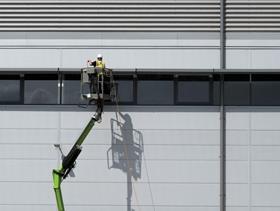ConsultantsÔÇÖ inability to get professional indemnity insurance puts replacement programme in jeopardy

Urgent clarity is needed on building regulations regarding cladding to prevent firms being barred from working on high-rise buildings by their insurers in the wake of the Grenfell Tower fire.
Several consultants spoken to by ║├╔½¤╚╔·TV said their insurers are refusing to provide professional indemnity insurance for work on cladding for high-rise buildings, with insurers suggesting only regulatory clarity will reduce their risks in providing cover.
The industry is supposed to be gearing up to replace aluminium composite material (ACM)-based cladding systems on 304 towers across the UK which are deemed to be in breach of building regulations following checks in the wake of the Grenfell fire. However, the programme is being held up by skills and funding shortages, as well as a lack of clarity over what the cladding should be replaced with.
These concerns over construction firmsÔÇÖ ability to get insurance follow widespread reports of rising premiums for those involved in cladding work.
Spencer Jones, director of roofing and cladding inspector Charnwood Roofing Associates, told ║├╔½¤╚╔·TV his professional indemnity premium has doubled and now restricts him from work on buildings over 18m, leisure facilities and schools, and from making any comments on ACM or aluminium.
Two other consultants spoken to by the magazine made similar claims, with one saying his insurer had added an endorsement to his policy limiting the insurerÔÇÖs liability for ÔÇ£cladding systems on any height or type of building if the claim relates in any way to fire protection or combustibilityÔÇØ. Two of the three have turned down work as a result.
A survey by the Construction Industry Council (CIC), revealed by ║├╔½¤╚╔·TV last week, found about half of the firms working on high-rises now have insurance prohibitions from certain types of work. About one-third of these ÔÇô 5% of all firms ÔÇô said they have stopped working on high-rises or with ACM.
CIC chief executive Graham Watts said this is a big issue in the light of an expected £2bn pipeline of work recladding existing unsafe towers.
ÔÇ£The evidence is firms are leaving the market, when thereÔÇÖs already a capacity issue. WhoÔÇÖs going to provide advice to clients on these buildings that need dealing with?
ÔÇ£Every week we hear from building owners saying that they canÔÇÖt get any people to give them advice.ÔÇØ



























No comments yet